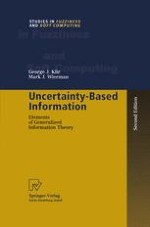Information is precious. It reduces our uncertainty in making decisions. Knowledge about the outcome of an uncertain event gives the possessor an advantage. It changes the course of lives, nations, and history itself. Information is the food of Maxwell's demon. His power comes from know ing which particles are hot and which particles are cold. His existence was paradoxical to classical physics and only the realization that information too was a source of power led to his taming. Information has recently become a commodity, traded and sold like or ange juice or hog bellies. Colleges give degrees in information science and information management. Technology of the computer age has provided access to information in overwhelming quantity. Information has become something worth studying in its own right. The purpose of this volume is to introduce key developments and results in the area of generalized information theory, a theory that deals with uncertainty-based information within mathematical frameworks that are broader than classical set theory and probability theory. The volume is organized as follows.
